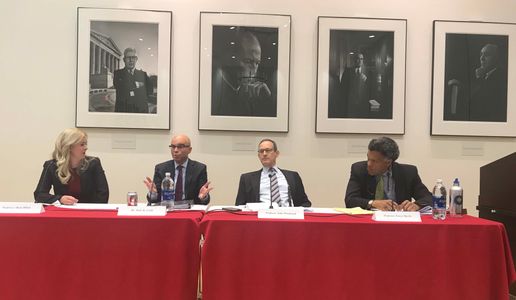Woodward Speaks at BU Law School Event

John D. Woodward, Jr., Professor of the Practice of International Relations at the Frederick S. Pardee School of Global Studies at Boston University, was a guest speaker at a Boston University Law School panel on November 16, 2017 to discuss a currently pending U.S. Supreme Court case, Carpenter v. US. In Carpenter, the Court will decide whether the warrantless search and seizure of historical cellphone records revealing the location and movements of a cellphone user over the course of 127 days is permitted by the Fourth Amendment.
BU Law Professor Tracey Maclin moderated the debate. BU Law student Jessica Lujan introduced the speakers who along with Woodward included Alicia Hilton, a professor at the John Marshall Law School and Peter Levitt, Esq., a former Assistant U.S. Attorney for the District of Massachusetts. The BU Law School’s Federalist Society sponsored the event.
The speakers and audience members had different views of the Carpenter case. Woodward was understanding of the privacy issues implicated by various new technologies in a highly-networked world, noting that “all data has become global.” Woodward contended that “The Supreme Court has held that the Fourth Amendment protects contents of communication sent over a network, but it does not protect non-content addressing information used to deliver that content,” citing examples of the outside of envelopes sent by postal mail, the record of telephone numbers called by a person, and physical surveillance of individuals in public spaces.
Woodward is a former Central Intelligence Agency officer who, during his twenty-year CIA career, served as an operations officer in the Clandestine Service and as a technical intelligence officer in the Directorate of Science and Technology, with assignments in Washington D.C., East Asia, Africa, South Asia, and the Middle East. He also served as the Director of the U.S. Department of Defense Biometrics Management Office from 2003-2005 where he received the Army’s third highest civilian award for his work on using biometric technologies to identify national security threats.